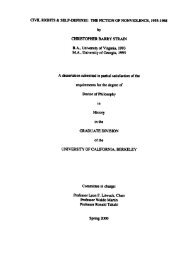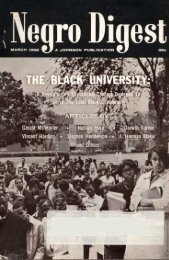Black News - Freedom Archives
Black News - Freedom Archives
Black News - Freedom Archives
Create successful ePaper yourself
Turn your PDF publications into a flip-book with our unique Google optimized e-Paper software.
Cointelpro Disruption<br />
Continues<br />
mut , V Ghss<br />
y<br />
Proof has continued to accumulate that the<br />
notorious Cointelpro operations, has still<br />
functioned beyond April of 1971, when it was<br />
supposedly officially discontinued :<br />
Whether or not Cointelpro continues to exist<br />
under its original code name, there is always the<br />
strong possiblility that a similar program with a<br />
different name, or no name at all, has surfaced in<br />
its place . At any rate, recent incidents and<br />
revelations throughout the country bear closer<br />
scrutiny, as the ominous spectre of Cointelpro<br />
lingers on .<br />
Two cases in North Carolina, the Wilimington<br />
10 and the Charlotte Three, involving persons<br />
convicted of crimes in the early `70's during<br />
periods of "racial disturbances," have been<br />
receiving plenty of attention by the media . In the<br />
Wilmington lb case, Rev . Ben Chavis and nine<br />
others were sentenced to prison on charges of<br />
arson during racial unrest in Wilmington, North<br />
Carolina in 1971 . Nine of the members have<br />
since been freed from prison, with the leader of<br />
the group of young civil rights workers still<br />
incarcerated .<br />
Charging President Carter with joining the<br />
conspiracy against Chavis and the Wilmington<br />
10, Dr . Charles Cobb, Executive Director of the<br />
Commission for Racial Justice of the United<br />
Church of Christ, recently announced plans to<br />
bring the case before the United Nations for a<br />
hearing . Amnesty International (A . L)<br />
recognized the 10 as "prisoners of conscience ."<br />
Cobb decided to take the case to the U .N . after<br />
repeated attempts to get the U .S . Department of<br />
Justice to look into charges that the 10 were<br />
framed and railroaded into jail were<br />
unsuccessful .<br />
In d quick reversal of form, the Justice<br />
Department, which had paid the witnesses that<br />
convicted them, has asked a federal judge in<br />
North Carolina to overturn the 1972 state court<br />
firebombing convictions of the Wilminton 10 .<br />
Drew Days III, chief of the Department's Civil<br />
Rights Division, stated in an 89-page brief that a<br />
review of the case has uncovered evidence that<br />
the defendants were denied their constitutional<br />
right to a fair trial . The brief asserts that the<br />
state prosecutor and judge suppressed a<br />
statement that raised doubts about the testimony<br />
of the key prosecution witness, and that this act<br />
kviolated the defendants' rights .<br />
Meanwhile, the three <strong>Black</strong> activists who<br />
comprise the Charlotte Three, remain<br />
imprisoned after their 1972 convictions for<br />
allegedly having firebombed a Charlotte riding<br />
stable that refused to rent horses to <strong>Black</strong> people .<br />
A recent appeal to have their case heard by the<br />
U.S . Supreme Court was rejected . The three,<br />
Jim Grant, T .J . Reddy and Charles Parker, were<br />
given 25, 2p, and 10-year prison terms<br />
respectively, the longest prison terms in state<br />
history for arson in which no one was injured .<br />
The Charlotte Three have also been adopted by<br />
A . I . as prisoners of conscience .<br />
These two cases are very closely linked for<br />
some interesting reasons . First, the prosecution<br />
used the same witnesses against both sets of<br />
defendants to obtain convictions . The<br />
witnesses, Al Hood and David Washington, had<br />
a long string of charges against them<br />
immediately prior to their testimony in the two<br />
cases . Washington, for example, was the prime<br />
suspect in five murder cases in the Charlotte<br />
area . But charges were dropped in exchange for<br />
his testimony against Chavis and the Charlotte<br />
Three trials .<br />
While it is widely acknowledges that bargains<br />
are made nearly all the time between the<br />
prosecution and what are felt to be key witnesses,<br />
who are given immunity in return for their<br />
testimony, immunity usually only extends to the<br />
particular case being tried, and not to a host of<br />
other unrelated crimes, as was done with Hood<br />
and Washington .<br />
But the most startling revelation which leads<br />
right to the core of the federal government, is<br />
that the two key witnesses were paid at least<br />
$4,000 apiece for their testimony by none other<br />
than the U.S . Department of Justice! The<br />
payments were authorized by then-Assistant<br />
Attorney General for Internal Security, Robert<br />
Mardian, later a Watergate felon . These facts<br />
were uncovered and reported two years after the<br />
Charlotte Three trial by the Charlotte Observer.<br />
The obvious question is why is the federal<br />
government paying money to witnesses, for<br />
testimony in State proceedings? Were these men<br />
employees or agents-provocateur for the federal<br />
government? From what funds were these<br />
witnesses paid? One thing is certain and that is<br />
that Mardian, John Mitchell, and other high<br />
government officials were'obviously interested in<br />
the outcome of these trials .<br />
In one of the bloodiest and most overt acts of<br />
murder carried out by local police with federal<br />
assistance, in the early morning hours of<br />
December 4, 1969, Illinois chapter <strong>Black</strong> Panther<br />
Party members Fred Hampton and Mark Clark<br />
were killed in their sleep . The repercussions;
















